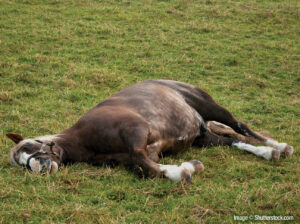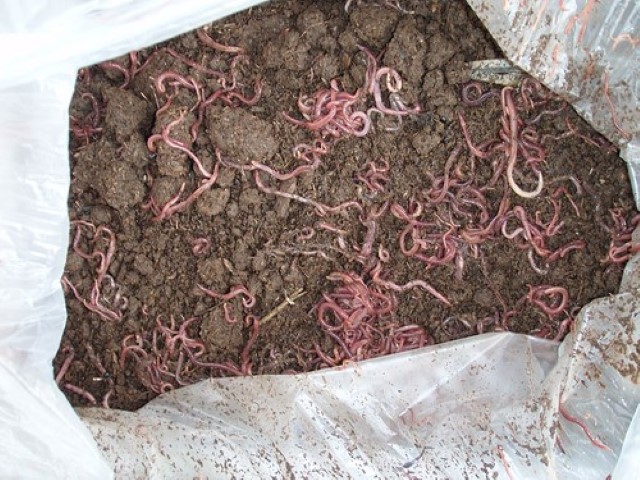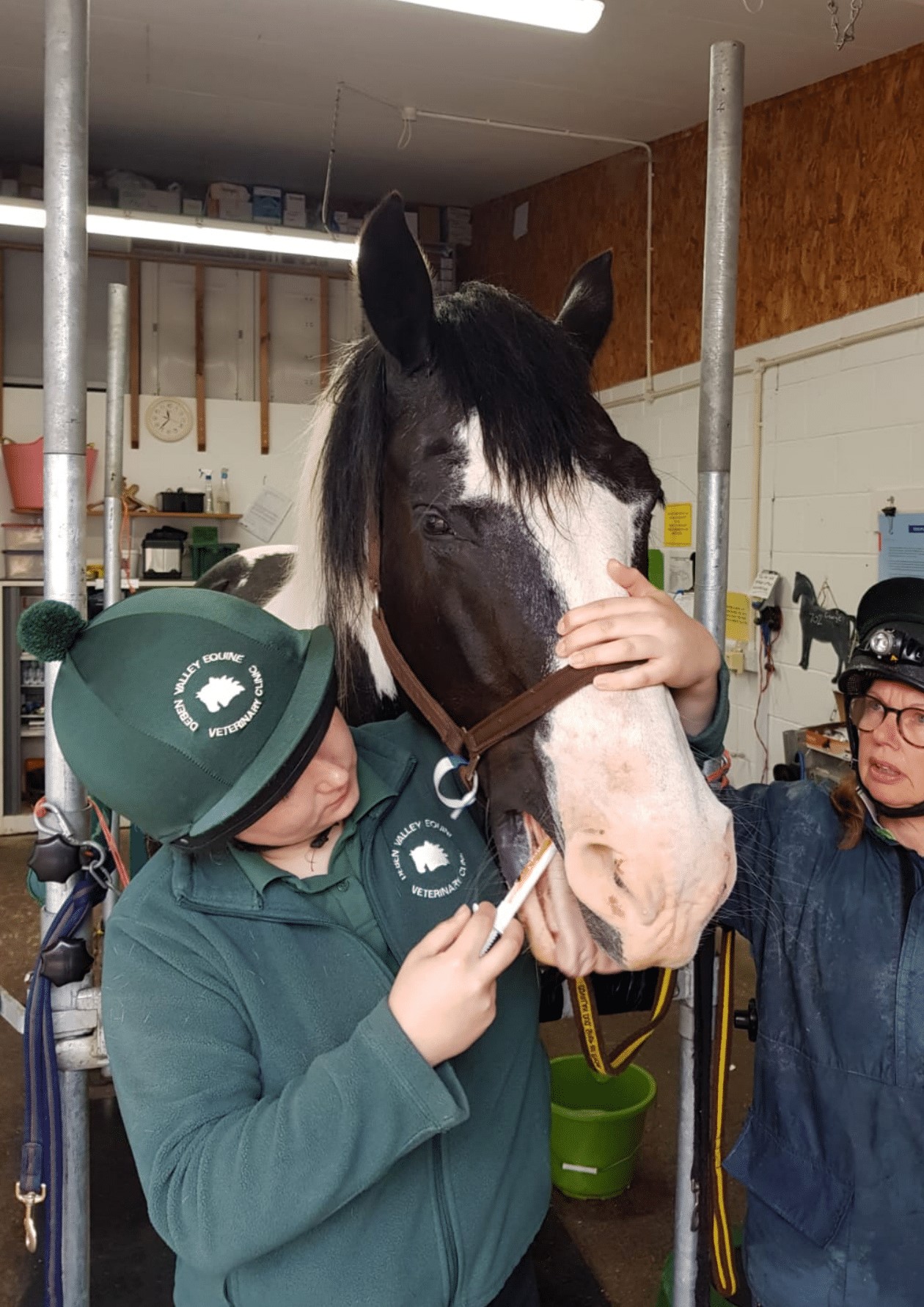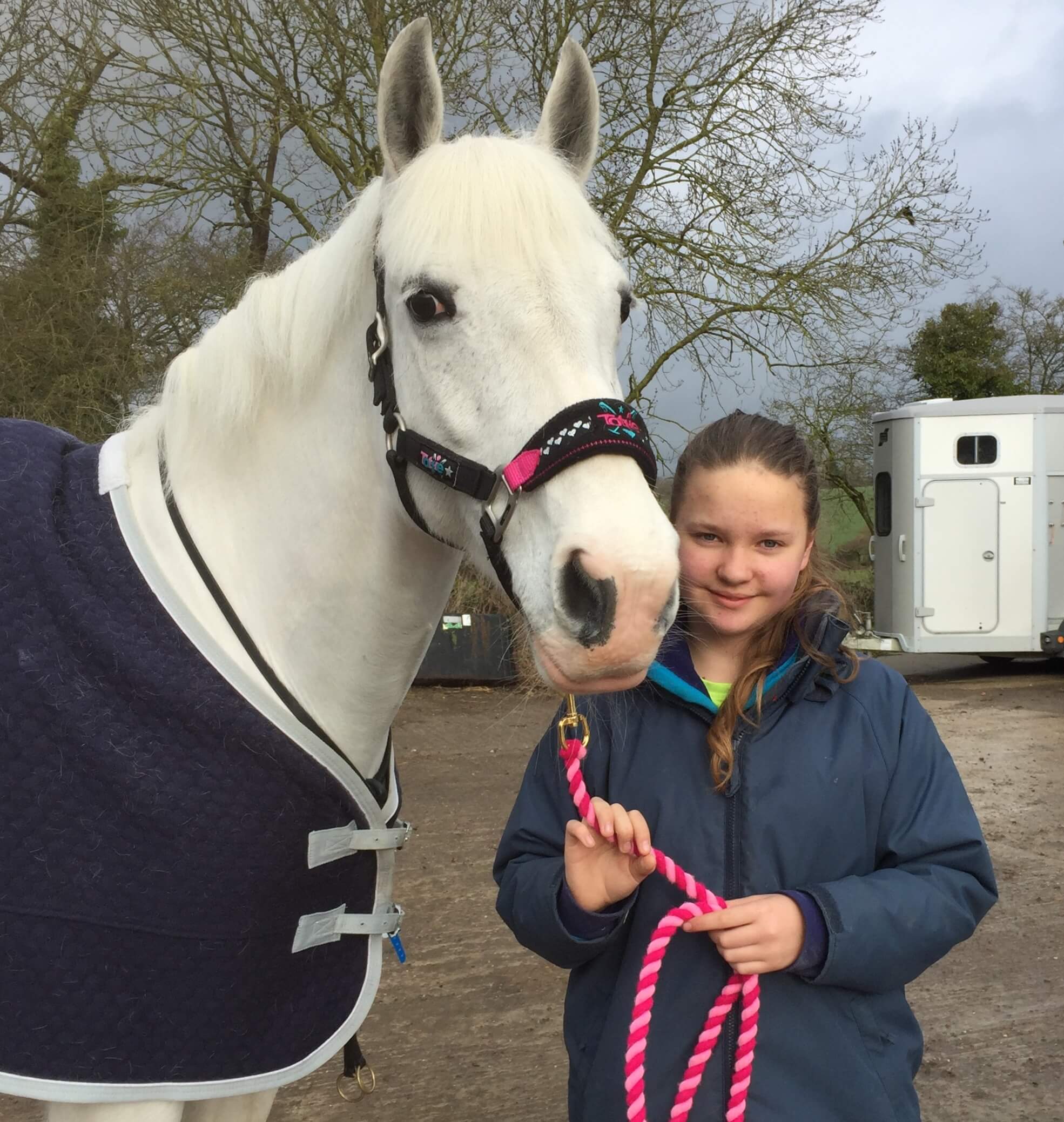EVERY FEBRUARY (AND THROUGHOUT THE YEAR) WE SELL COMPLETE ANNUAL WORMING PROGRAMMES TAILORED TO YOUR NEEDS; THESE INCLUDE ALL THE WORMERS FOR THE YEAR WITH A CALENDAR – WORM EGG COUNTS CAN BE INCLUDED AND THEY ARE EXTREMELY GOOD VALUE – ALSO SINCE 2016 WE HAVE OFFERED AN ENVIRONMENTALLY FRIENDLY WORMING PROGRAM WITH A LOT OF TESTING AND ONLY 1 DOSE OF WORMER – JUST ASK THE VETS FOR MORE INFORMATION.
Despite major medical and pharmaceutical advances, the sad fact is that at the beginning of the twenty first century, horses and ponies still die from the effects of worms (endoparasites). Although youngsters and aged horses seem more at risk; horses of any age can suffer from the debilitating effects of worms, such as, weight loss, diarrhoea, colic, poor performance and unthriftiness. See article on tapeworm & colic.

Horse with colic.
Which wormer to use?
There are many types of worms, which can infest your horse; different types of parasite are killed by different types of wormers (anthelmintics).
Tapeworm
are only killed by a double dose of pyrantel e.g. Strongid-P, Pyratape-P, Exodus, Embotape or a single dose of praziquantel found in Equimax & Pramox.
Bots
Are only killed by ivermectin e.g. Eqvalan, Normectin, Vectin, Bimectin, Eraquell or Equi-max or moxidectin e.g. Equest
Encysted larval stages of redworm
May not be totally eliminated by any product but a five day course of fenbendazole, i.e. Panacur Equine Guard and Moxidectin (Equest) are the only products licensed for treatment. (worm resistance to fenbendazole has been identified in some areas)

Redworm in dung
Redworm (small strongyles)
Are killed by all groups of wormers; although in some areas, resistance to Benzimidazoles and pyrantel have been discovered.
All these parasites spend part of their lifecycle outside the host (your horse), which is why pasture management is so important. Regular (TWICE WEEKLY) removal of dung from pasture will greatly reduce the number of infective eggs/larvae that your horse can ingest and is the cheapest way of protecting your horse from worm damage. If you regularly poo pick & have a static population of horses then at certain times of the year it is cost-effective to have worm egg counts (WEC) performed on the dung (It costs about £10.50 for us to test the dung in our lab). If a horse’s faecal egg count is negative / low, you can be environmentally friendly & save money by missing out a wormer. A competitively priced test for tapeworm is now also available – we can easily supply these tests for you to do.
Owning a horse is a very expensive business and worming them correctly contributes to the annual budget by around £110 per horse per year. The introduction of Equest (containingMoxidectin) to the UK market may help to reduce costs; manufacturers claim that it can provide a prolonged reduction in faecal strongyle egg output of 13 weeks compared to 8-10 wksivermectin; 4-6 wkspyrantel; 6-8 wks fenbendazole. It has no action on tapeworm or lungworm, but has some effect on stages of bot larvae and inhibited redworm larvae. Deben Valley Equine are very aware of the problem of wormer resistance & with your help, using strategic testing (Faecal WEC & Equisal) & correctly dosing by weight when you do worm we can prevent further drug resistance.
Using wormer pastes
Equest pramox, will kill all types of worms, but to use it all the time is overkill and likely to create problems with worms becoming resistant to drugs. It is better to use certain wormers at different times of the year. We produce ANNUAL WORMING PROGRAMMES each Jan / Feb at greatly reduced costs to you so you don’t have to worry about which wormer when!

Paste Administration
WORMING TIPS
- Worm all horses at the same time.
- Worm all new horses prior to turnout and keep in for 3-4 days.
- Worm foals from 6 weeks of age (ivermectin, pyrantel or equimax. Moxidectin after 4 months of age).
- Keep horses in for 24-48 hours after dosing.
- Equest, eqvalan, equimax, strongid-P & pyratape-P are all OK to give to pregnant or lactating mares, but as always keep handling stresses to a minimum.
- Your horse’s weight can be estimated by use of a weigh tape, a weighbridge is more accurate. Equest can be toxic if overdosed so MUST BE DOSED ACCURATELY.
- Tapeworm spread via forage mites in hay, & feed/straw and the grazing. Autumn tapeworm dosing should be performed after the first frost or end of the grazing season.
- To avoid resistance, altering your main wormer annually remains a valid consideration, but you must still use enough products to kill all groups of worm.
- Be careful with horse wormers and other animals e.g. Equest has been fatal to dogs. Dispose of containers carefully & thoughtfully.
ASK YOUR VET
EVERY FEBRUARY (AND THROUGHOUT THE YEAR) WE SELL COMPLETE ANNUAL WORMING PROGRAMMES TAILORED TO YOUR NEEDS; THESE INCLUDE ALL THE WORMERS FOR THE YEAR WITH A CALENDAR – WORM EGG COUNTS CAN BE INCLUDED AND THEY ARE EXTREMELY GOOD VALUE – ALSO SINCE 2016 WE HAVE OFFERED AN ENVIRONMENTALLY FRIENDLY WORMING PROGRAM WITH A LOT OF TESTING AND ONLY 1 DOSE OF WORMER – JUST ASK THE VETS FOR MORE INFORMATION – NOW AVAILABLE WITH REDWORM TESTING & NO WORMER .
Last updated January 2022
